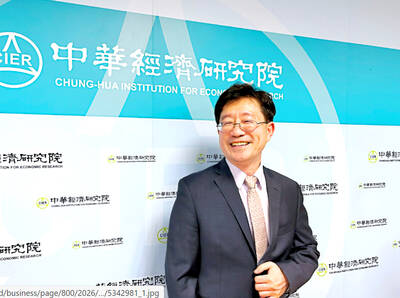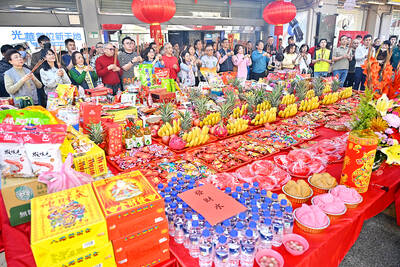As both sides of the Taiwan Strait engage in vibrant economic exchanges, President Ma Ying-jeou (馬英九) has said he would consider peace talks with Beijing if re-elected in 2012.
That possibility worries some political observers who said that any peace talks promoted by closer economic ties might end up serving Beijing's political agenda.
Ma first made the remarks in an interview with Singapore's Lianhe Zaobao (聯合早報) published on May 8 and then again during an interview with Taiwan's China Television Co (CTV) last week. He added, however, that political negotiations do not necessarily have to start in 2012, saying it would depend on developments and whether more pressing issues, such as the economy, had been addressed.
Ruan Ming (阮銘), a Chinese political analyst and a consultant at the Taiwan Research Institute, said Ma's policy to proceed gradually was similar to Chinese president Jiang Zemin's (江澤民) “Jiang's Eight Points” (江八點).
To reach China's ultimate goal of unification, Jiang's eight-point proposal includes developing economic exchanges and cooperation, promoting direct transportation links, advancing talks on regular affairs and officially ending cross-strait hostilities.
Beijing reaffirmed “Jiang's Eight Points” in January this year when Chinese President Hu Jintao (胡錦濤) proposed signing a peace agreement and establishing a military confidence-building mechanism.
Ruan said China has changed its tactics but not its goal. Ma, however, seemed to be more anxious to see Beijing achieve its goal.
“Ma will never win this war with the Chinese Communist Party,” Ruan said. “Beijing has a comprehensive game plan in place, but Ma builds his cross-strait policy on a fictitious ‘1992 consensus' and recognition of 'one China.'”
Had Ma's predecessors — former presidents Lee Teng-hui (李登輝) and Chen Shui-bian (陳水扁) — been willing to accept the “one China” policy, direct transportation links would have been launched during their terms in office, Ruan said.
Desperate to divert attention from his administration's lackluster performance in domestic issues, Ruan said, Ma is aggressively pushing cross-strait affairs. Beijing is worried, however, that if Ma goes too fast, Taiwanese may not like it, so it must step on the brakes, he said.
Ruan cited the Ma administration's keen interest in signing an economic cooperation framework agreement (ECFA) with China as an example, despite Beijing's lukewarm response and opposition from the Democratic Progressive Party (DPP).
Ruan said China would make an all-out effort to help Ma win re-election, adding that Beijing was likely to dole out more small favors while keeping a tight rein on things to avoid upsetting the Taiwanese.
If Ma is smart, he would make good use of the DPP's opposition and use it as leverage in negotiating with China, Ruan said.
“But it seems Ma does not understand this,” he said. “He is upset with the DPP because he thinks they are against him. He does not seem to grasp the concept that the opinion of the opposition party should outweigh that of China.”
Ma's reluctance to communicate with the DPP can be attributed to the fact that the party is not a strong opposition, Ruan said.
If Ma genuinely cared about democracy and really wanted to follow the footsteps of his mentor, the late president Chiang Ching-kuo (蔣經國), he should have helped the DPP become a powerful party, Ruan said, because only with a healthy democracy can the country increase its bargaining chips at the negotiating table.
Former national policy adviser Huang Hua (黃華) said it was wishful thinking to handle economic issues first and political ones later because some economic issues touched on political aspects.
Huang said he did not think Ma had the political acumen to deal with Beijing.
China does not recognize Taiwan, but it does not think it is necessary to annihilate it, Huang said, because Taiwan no longer harbors dreams of “reclaiming mainland China.”
Beijing must also abandon its campaign to unify with Taiwan as the two sides are unlikely to merge because of differences in their system of government and way of life, Ruan said.
Political scientist Yang Tai-shuen (楊泰順) of Taipei's Chinese Culture University, however, said he found the opposition's allegations that the Ma administration had traded sovereignty in exchange for short-term economic interests far-fetched.
“Beijing has never recognized Taiwan and both sides are hostile to each other,” he said.
To improve the economy, Taiwan has little choice but to engage China, Yang said, and it is inevitable that the two sides would touch on politically sensitive issues.
“Beijing cannot care less. It can wait forever,” he said. “But for a smaller country like Taiwan, we must adopt a more flexible approach and find a way to survive.”
A leader should adapt to changes around him, he said.
“I don't think it is fair to say what he is doing now is selling out Taiwan,” Yang said. “If we refuse to engage Beijing and, as a result, undermine the economy, isn't it another way of selling out the country?”
Hu Tzu-ching (胡祖慶), professor of international politics at Tunghai University, said it would be too late to begin political negotiations with Beijing in 2012, saying such a political framework should be established long beforehand.
Hu said he believed Ma has the intelligence and ability to deal with China, but Ma must realize that he may spend decades trying to secure the backing of pan-green supporters and that he is unlikely to use them to pressure Beijing for concessions.
“Beijing has gained so much confidence over the past eight years,” he said. “It may prefer to see the pan-blues stay in power, but it has also learned how to maintain close contact with the pan-greens.”

The Grand Hotel Taipei on Saturday confirmed that its information system had been illegally accessed and expressed its deepest apologies for the concern it has caused its customers, adding that the issue is being investigated by the Ministry of Justice Investigation Bureau. The hotel said that on Tuesday last week, it had discovered an external illegal intrusion into its information system. An initial digital forensic investigation confirmed that parts of the system had been accessed, it said, adding that the possibility that some customer data were stolen and leaked could not be ruled out. The actual scope and content of the affected data

DO THEY BITE IT? Cats have better memories than people might think, but their motivation is based entirely around the chance of getting fed Cats can remember the identity of the people who fed them the day before, Taipei-based veterinarians said on Friday, debunking a popular myth that cats have a short memory. If a stray does not recognize the person who fed them the previous day, it is likely because they are not carrying food and the cat has no reason to recognize them, said Wu Chou Animal Hospital head Chen Chen-huan (陳震寰). “When cats come to a human bearing food, it is coming for the food, not the person,” he said. “The food is the key.” Since the cat’s attention is on the food, it

Taiwan must act to preempt potential Section 301 investigations as US President Donald Trump moves to a new tariff strategy, following a US Supreme Court ruling that voided tariff measures, an academic said yesterday. Countries running the largest trade surpluses with the US face a growing likelihood of Section 301 investigations, Chung-Hua Institution for Economic Research president Lien Hsien-ming (連賢明) said. Section 301 refers to a provision of the Trade Act of 1974 that allows Washington to impose retaliatory tariffs over perceived unfair trade practices, including the running of large trade surpluses. Because Taiwan has become the fourth-largest source of the US’ trade

People hold incense and pray with offerings in front of Taipei’s Kuanghwa Market yesterday. The fifth day of the Lunar New Year is traditionally about welcoming the God of Wealth, during which companies and shops set off firecrackers to celebrate their reopening and pray for good business in the new year.